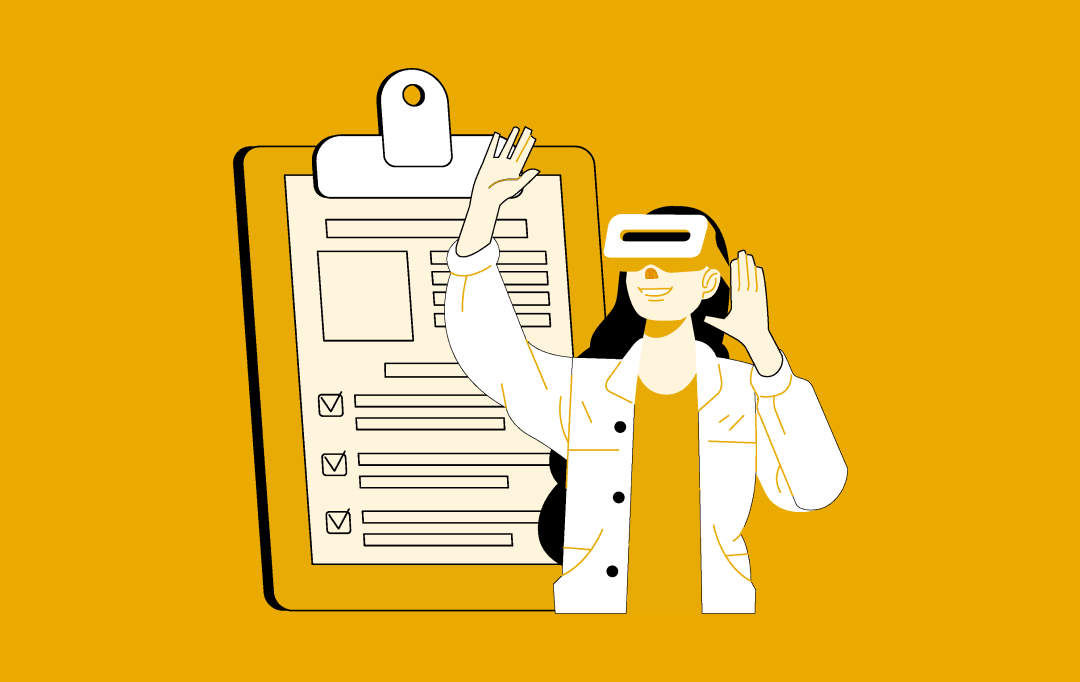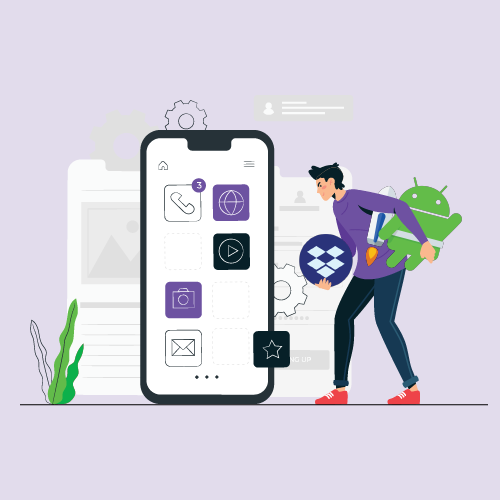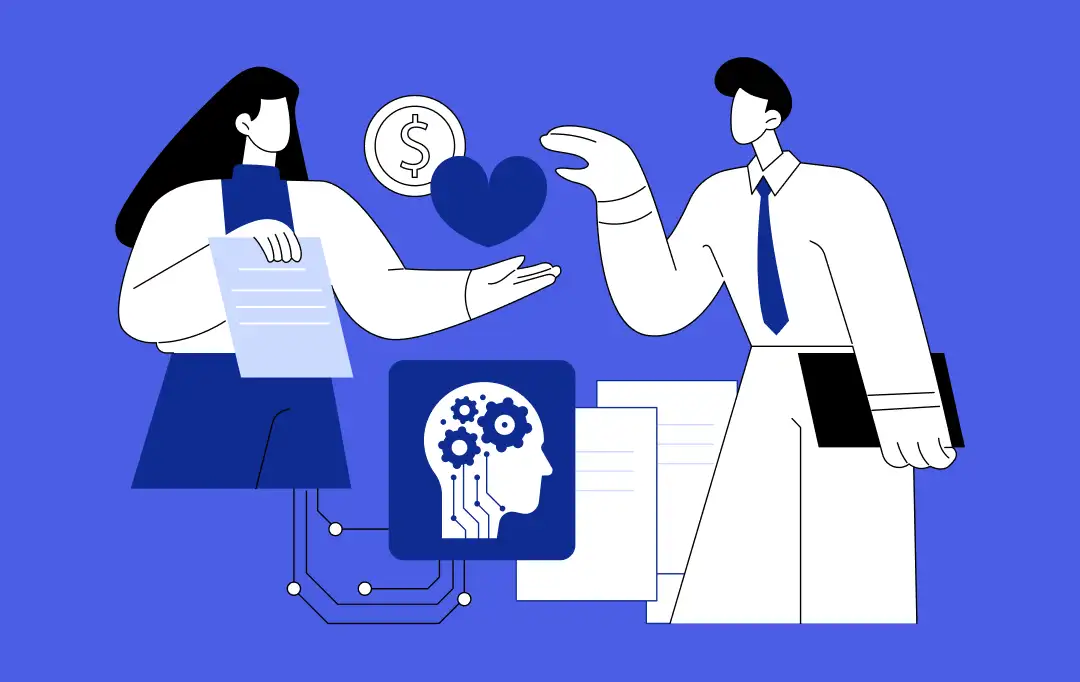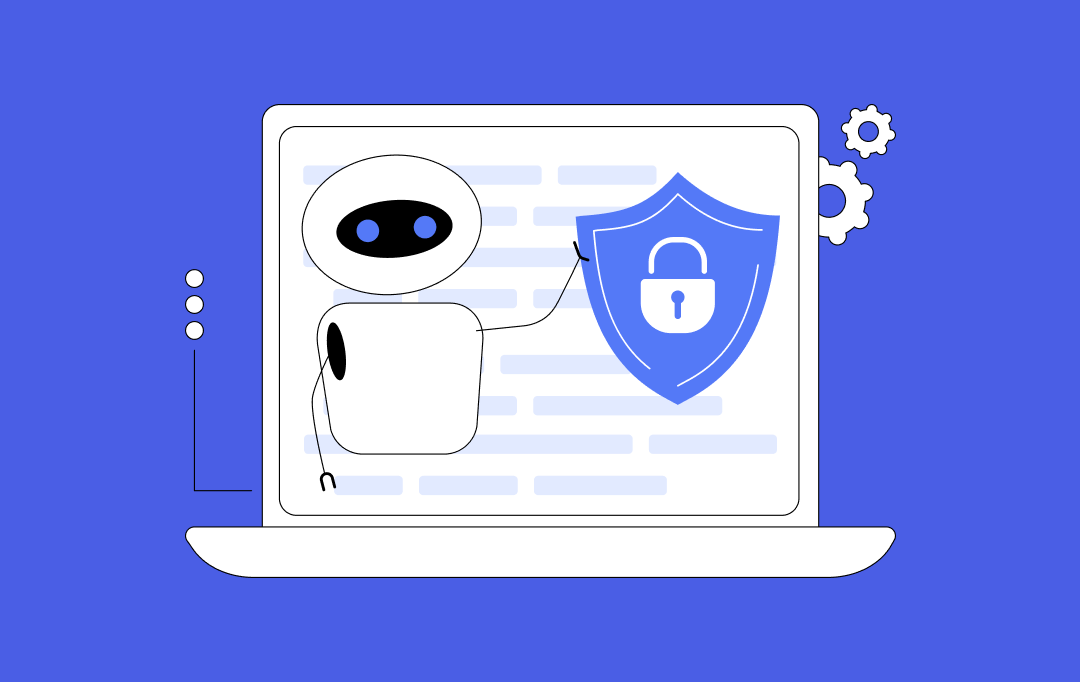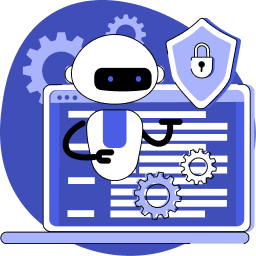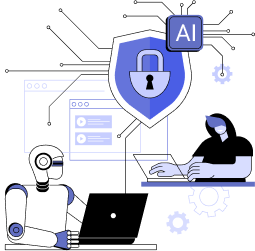- Understanding Confidential AI and How It Differs from Traditional AI Security
- How Confidential AI Works
- Key Technologies Behind Confidential AI
- Homomorphic Encryption
- Secure Multi-Party Computation (MPC)
- Trusted Execution Environments (TEEs)
- Federated Learning
- Differential Privacy
- Zero-Knowledge Proofs (ZKPs)
- Confidential and Private Collaborative (CaPC) Learning
- Privacy-Preserving Decentralized AI
- How Does Confidential AI Cultivates Trust
- Storing Sensitive Data
- Transparency and Accountability
- Building Brand Reputation
- Enabling Ethical Innovation
- Better Data Tracking and Accountability
- Preventing AI Model Theft
- Supporting a Privacy-First Culture
- Top Industrial Use Cases and Applications of Confidential AI
- Healthcare
- Finance
- Retail
- Telecommunications
- Manufacturing
- Energy
- Government & Defense
- Education
- Transportation & Logistics
- Pharmaceuticals
- Steps to Integrate Confidential AI
- Evaluate Data Sensibility and Compliance Needs
- Choose The Right Confidential AI Technologies
- Design Secure AI Workflows
- Implement Confidential AI in the Right Setups
- Keep Track, Audit, and Periodically Update
- Build an Organizational Privacy Culture
- Overcoming Challenges in Implementing Confidential AI
- High Computerization
- Integration Complexity
- Data Restrictions on Cross-Border and Regulatory Compliance
- Limited Vendor and Tool Support
- Employee Knowledge and Skill Gaps
- Implement Confidential AI with Appinventiv’s Proven Expertise
- FAQs
Key takeaways:
- Confidential AI helps secure sensitive data not only in storage or transit, but also in on-the-fly processing, and makes AI models in regulated sectors safe.
- Homomorphic encryption, federated learning, and secure enclaves are some of the key technologies that ensure that privacy and security are maintained in AI computing and offer a strong line of defense to the AI lifecycle.
- Industries such as healthcare, finance, and government are being revolutionized by confidential AI, which allows organizations to collaborate on sensitive data without violating privacy and is fully compliant with stringent regulatory requirements.
- The transition to a privacy-first strategy, ethical data management, continuous monitoring, and alignment of the organization with privacy rules should accompany the introduction of Confidential AI.
When Google rolled out Confidential Virtual Machines on the A3 machine series with NVIDIA H100 GPUs, it completely changed the concept of secure AI. These confidential VMs safeguard AI, machine learning, and scientific simulation workloads while data is processed, leveraging hardware-based security from CPUs and extending it to GPUs (Source: Google Cloud). By letting sensitive workloads work securely on shared or cloud infrastructure, Confidential AI opens up new chances for innovation in regulated industries and collaborative research.
AI’s quick expansion has caused a huge jump in data usage. Organizations collect, store, and look at massive amounts of sensitive information, from personal health records and financial transactions to proprietary research and corporate intelligence. This data drives innovation, but it also brings real security and privacy problems. Regular data protection methods, such as encryption at rest or in transit, can’t fully fix the issues that happen when AI actively processes data.
By putting privacy and security right into AI computation, organizations can use powerful models without showing raw data. As reported by McKinsey, organizations often centralize risk, compliance, and data governance when deploying AI, while tech talent and AI adoption are usually managed through a hybrid model, mixing central and distributed resources. Smaller organizations under $500 million in revenue tend to fully centralize these functions more often.
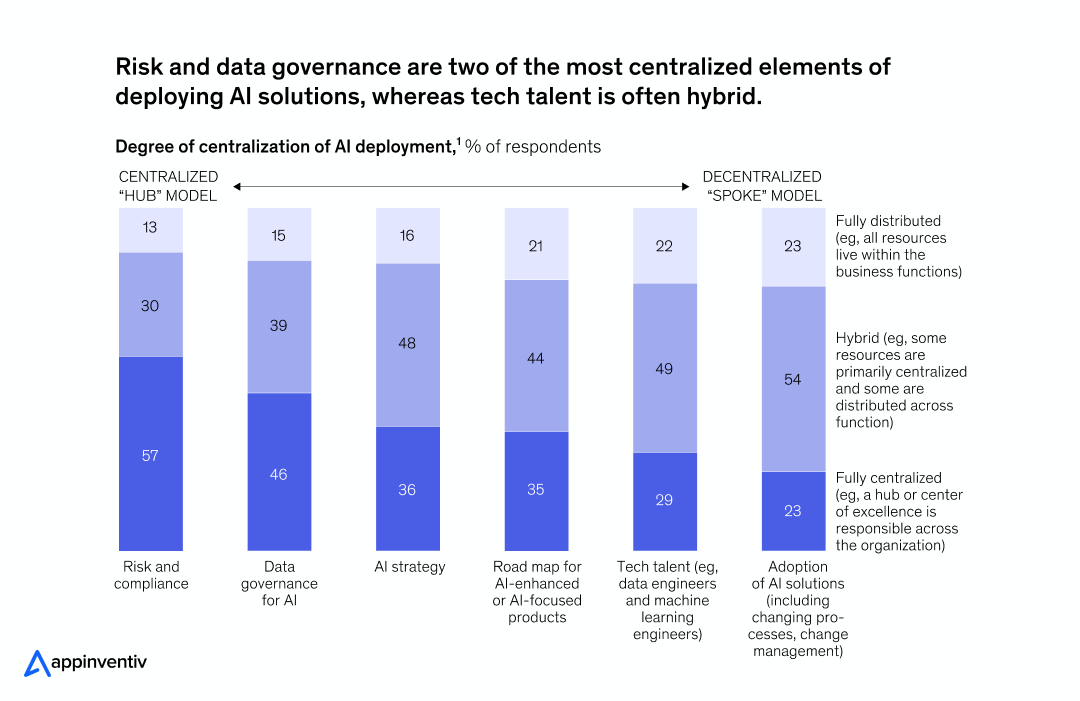
This structured approach to AI deployment makes Confidential AI work really well, since centralized oversight protects sensitive data while hybrid models let teams innovate securely across different functions and business units.
Confidential AI connects innovation with security, letting businesses go after advanced analytics, collaborative machine learning, and AI-driven insights while keeping trust, compliance, and regulatory standards solid.
This blog offers you a complete picture of Confidential AI: what it is, why it matters in today’s data-focused world, and how it protects the most sensitive information during every part of AI processing. From hardware-based protections and privacy-preserving methods to secure deployment models, we will look at how Confidential AI is changing the way organizations can safely use the full power of artificial intelligence.
Partner with us to implement confidential AI for your business
Understanding Confidential AI and How It Differs from Traditional AI Security
Confidential AI lets businesses work with sensitive data while keeping it completely secure throughout the entire process. Your information stays protected during storage, transfer, and most importantly, during actual use. Regular security only covers data when it sits idle or moves around, but this approach protects information even while AI systems actively process it.
Companies get real value from their confidential data without worrying about unauthorized access, insider threats, or hackers. The technology relies on homomorphic encryption, federated learning, and secure enclaves for protection that overall helps to build robust AI solutions for enterprises that work reliably.
Healthcare, finance, and government sectors need this because privacy cannot be compromised. Built-in security helps organizations meet strict regulations while still using powerful analytics. AI on encrypted data lets models analyze information without revealing raw inputs, while AI data anonymization protects individual identities. Companies choosing on-premise AI deployment keep full control over sensitive datasets without depending on external cloud services.
Let’s now understand the key differences between confidential and traditional AI security with this detailed table below:
| Aspect | Traditional AI Security | Confidential AI |
|---|---|---|
| Focus | Keeps data safe when stored and moved around | Keeps data safe when stored, moved, and actively being used |
| Vulnerability | Information can get exposed while being processed | Data stays encrypted or separated even when AI works with it |
| Techniques | Firewalls, network protection, regular encryption | Homomorphic encryption, federated learning, differential privacy, secure enclaves |
| Hardware Role | Uses basic existing IT setup | Needs Trusted Execution Environments (TEEs) or special secure hardware |
| Compliance & Privacy | Depends on outside rules and monitoring | Builds privacy right into AI workflows, meets regulatory requirements naturally |
| Risk Mitigation | Guards the edges; responds after problems happen | Guards the actual data; prevents problems before they start |
Here the difference is quite evident: whereas conventional AI security is most likely to secure data at rest or transit, Confidential AI can guard sensitive data even when it is actively being processed, thus enabling organizations to use their data to its fullest extent without sacrificing privacy, security or compliance.
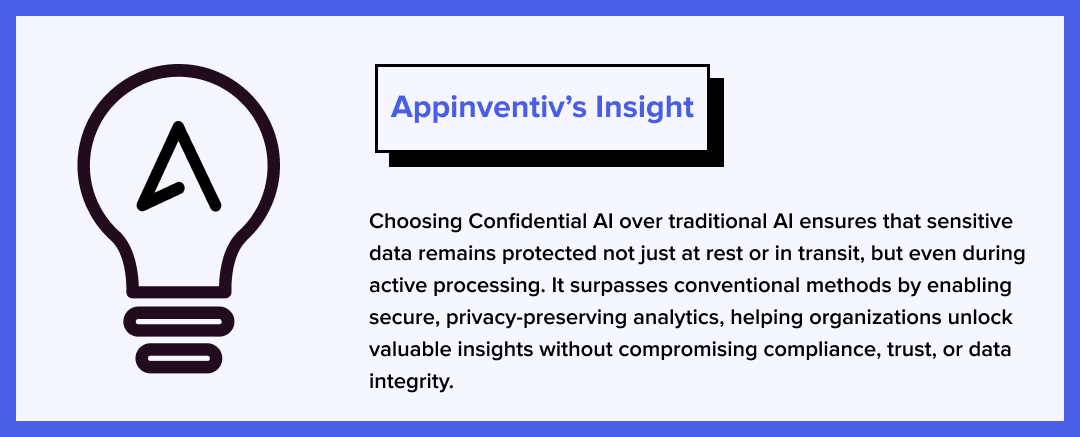
How Confidential AI Works
Confidential AI not only provides protection to data when stored or transferred, but it also protects data that is undergoing processing. It delivers sensitive data protection on all levels of the AI lifecycle by integrating AI and data encryption for privacy with risk-free hardware conditions and AI data privacy protection. Let’s see how it works:
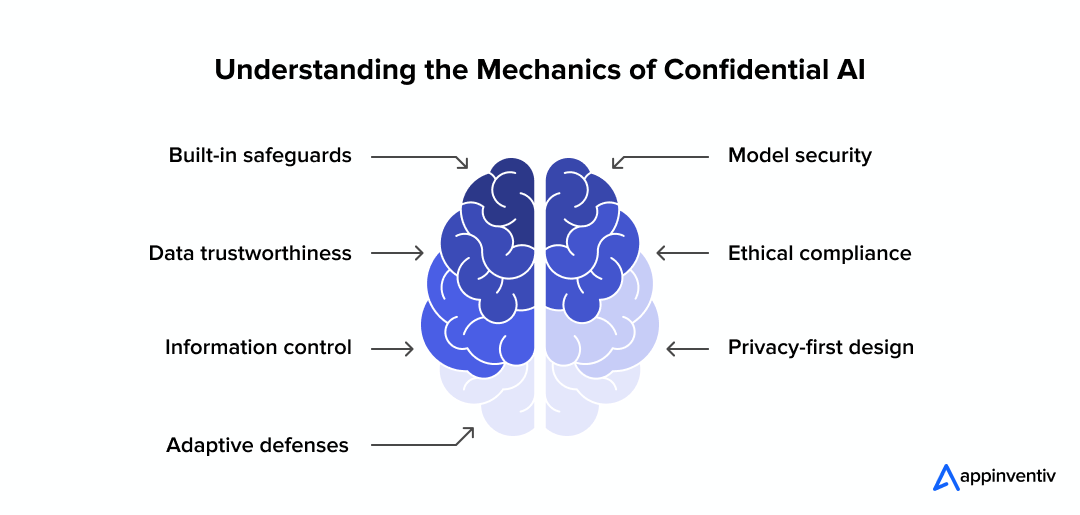
- Built-in safeguards: Confidential AI weaves robust AI data protection strategies into every processing step, keeping sensitive information secure from people who shouldn’t access it.
- Model security: Smart techniques for AI model theft prevention guard intellectual property while letting organizations grow their AI systems with confidence.
- Data trustworthiness: By keeping detailed AI data provenance, confidential AI helps companies track how data gets used and maintain accountability throughout their workflows.
- Ethical compliance: Working alongside AI ethics and privacy, confidential AI supports responsible innovation that respects user rights and meets regulatory requirements.
- Information control: Built specifically for protecting sensitive data with AI, these systems cut down exposure of personal or business-critical information.
- Privacy-first design: Strong AI data privacy protection methods reduce risks connected to storage, sharing, and live processing.
- Adaptive defenses: Using AI-driven privacy protection, confidential AI keeps adjusting to new threats while maintaining the right balance between security and system performance.
Key Technologies Behind Confidential AI
Confidential AI uses several smart technologies to keep sensitive information safe while still delivering powerful insights. These different tools tackle various privacy and security problems, working together to build multiple layers of protection.
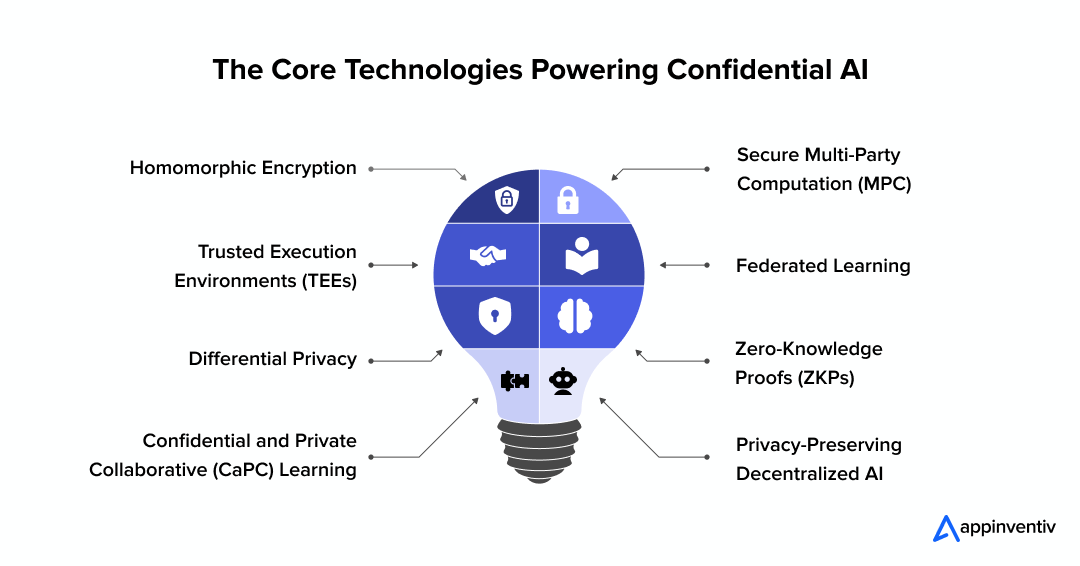
Homomorphic Encryption
This technology lets you run calculations on encrypted data without having to decode it first. Companies can use their AI models on private datasets while keeping all the actual information completely hidden from everyone, even system admins and cloud service providers. Since the data stays encrypted during the entire process, homomorphic encryption makes sure your privacy never gets compromised during processing.
Secure Multi-Party Computation (MPC)
Secure MPC lets different organizations work together on calculations without sharing their private information. Picture several hospitals or banks wanting to build a joint AI model, but keeping their raw data completely separate. Each organization sends in its encrypted information, and the system only shows the combined final results while keeping everyone’s individual data completely private.
Trusted Execution Environments (TEEs)
TEEs are special secure zones built directly into computer hardware, where sensitive calculations occur away from all other processes. The data and programs running inside these protected areas stay completely hidden from outside users, system administrators, and even the main operating system. These secure spaces give AI models a safe place to run, keeping both the information going in and the model itself completely confidential. This protection becomes really important when companies need to guard their valuable intellectual property.
Federated Learning
Federated learning lets AI models get trained using data from many different places without that information ever leaving its original location. Each participant works with the model on their own system and only shares encrypted updates or mathematical changes. This method keeps everything private and lowers risks while still allowing multiple organizations or devices to work together on learning. It works perfectly for areas like healthcare, banking, and mobile apps where sharing data directly isn’t allowed.
Differential Privacy
Differential privacy adds specially measured random noise to datasets or model results to stop anyone from identifying specific individual records. Organizations can still pull out useful insights and train their AI models without putting personal or sensitive information at risk. This technique finds the right balance between being useful and staying private, making sure AI analysis stays valuable while protecting individual people’s confidentiality. Consumer data companies and regulated industries use differential privacy all the time.
Zero-Knowledge Proofs (ZKPs)
ZKPs let one party prove that a calculation or statement is correct without showing any of the actual data behind it. In confidential AI, ZKPs help confirm that computations, model quality, or compliance requirements are met without exposing any sensitive information. They give strong guarantees of trust and privacy, making secure partnerships and regulatory compliance possible. Finance, government, and multi-party AI projects find ZKPs especially valuable.
Confidential and Private Collaborative (CaPC) Learning
CaPC learning brings together methods like MPC, homomorphic encryption, and TEEs to make secure collaborative AI training work. Multiple organizations can train AI models together even when their datasets look completely different or come from various sources. CaPC keeps all data confidential while still helping models learn effectively, making it perfect for research groups, cross-industry partnerships, and sensitive business applications.
Privacy-Preserving Decentralized AI
Confidential computing is introduced into distributed AI systems by privacy-preserving decentralized AI. It maintains data sets as well as AI models securely on the edge devices or decentralized network locations. Organizations can extract distributed computing strength, whilst preserving their intellectual property and sensitive data. This is very effective with IoT networks, edge AI, and many-node designs that require high levels of privacy.
How Does Confidential AI Cultivates Trust
Due to the ever-changing news of data breaches and privacy scandals, trust has become a necessity for businesses and organizations. Confidential AI for data security builds trust by ensuring sensitive information remains secure, and at the same time, companies remain in a position to innovate and make smart decisions.
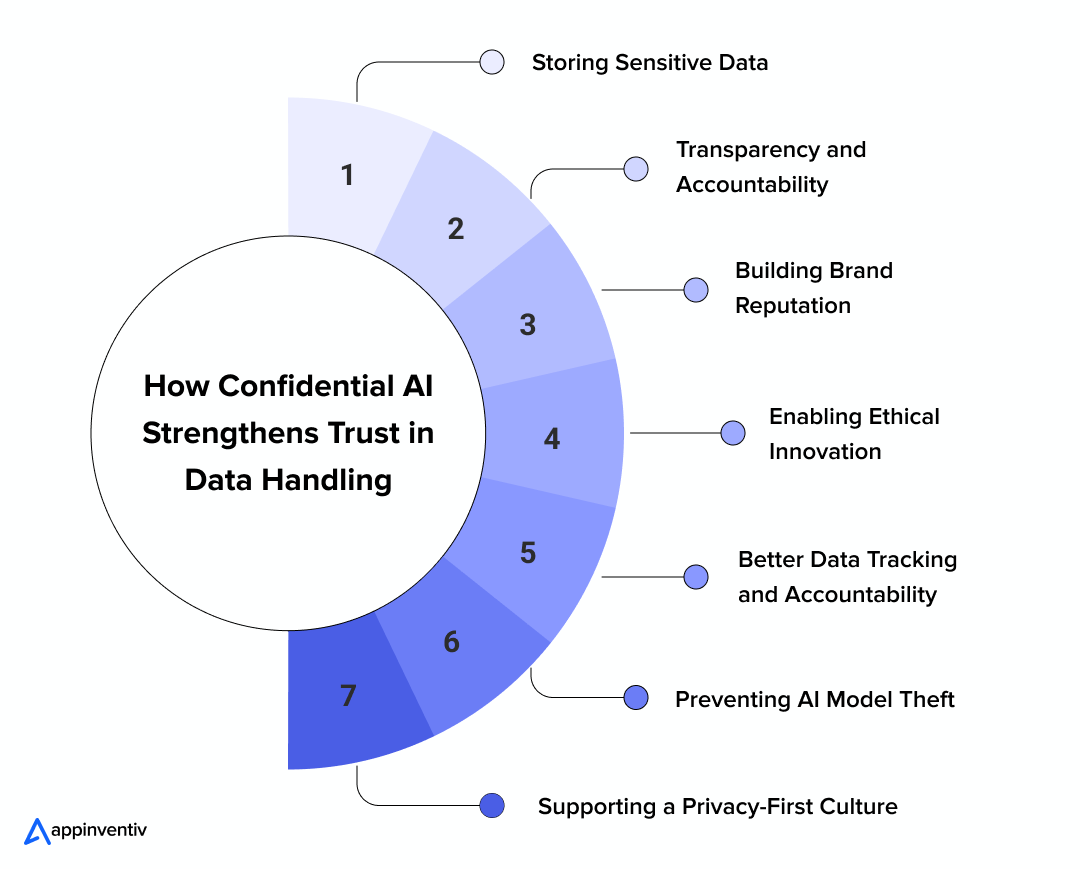
Storing Sensitive Data
With confidential AI, information is not accessed by unauthorized individuals even during its processing. Solutions such as secure enclaves, homomorphic encryption, and federated learning enable AI systems to process information without exposing the real information.
Companies demonstrate that they are actually concerned about privacy by ensuring that information is secure at all stages (when stored, moved, and used). Such a proactive AI business strategy assures customers, partners, and regulators that their data will not end up misused or stolen and enhances the overall protection of AI data security.
Transparency and Accountability
Trust goes beyond just security and includes being open about what you’re doing. Confidential AI systems often come with ways to audit and explain their processes. Companies can show how data gets handled, how models get trained, and what protections are in place. This openness lets everyone involved check that AI systems follow ethical rules and meet legal requirements, supporting broader AI data security efforts.
Building Brand Reputation
When businesses use confidential AI, they show that protecting data matters to them. In fields like healthcare, finance, and government services, where privacy is crucial, this focus boosts credibility. Customers prefer working with companies that respect their information, while partners and investors see less risk in doing business together. These steps show a real commitment to secure AI deployment that creates long-term confidence.
Enabling Ethical Innovation
Confidential AI lets companies use powerful analytics and predictive insights without putting privacy at risk. Methods like federated learning and encrypted computation make AI for sensitive data possible while staying within privacy laws. When companies implement private AI solutions, they can align their technological capabilities with ethical practices, providing stakeholders with confidence that their data is being handled appropriately.
Better Data Tracking and Accountability
Confidential AI secures sensitive information and guarantees AI data provenance, helping organizations track where data comes from and how it moves throughout the AI lifecycle. This makes every step in data handling traceable, reducing misuse or accidental exposure. Teams working on shared datasets know all actions can be audited, while regulators can check compliance with privacy standards. Organizations build trust in their AI systems and the data they use by maintaining a clear chain of custody.
Preventing AI Model Theft
Confidential AI protects the underlying data and AI models themselves, addressing AI model theft prevention concerns. Proprietary algorithms, intellectual property, and insights from sensitive datasets stay protected from unauthorized access. This matters for enterprises in competitive sectors where AI model leakage causes serious operational problems. Organizations keep their AI assets private by building security at data and model levels, boosting stakeholder confidence and making secure collaboration possible.
Supporting a Privacy-First Culture
Adoption of confidential AI promotes a culture of privacy first, in which sensitive data is safeguarded with the help of AI becomes the norm among organizations. The responsible use of AI is first seen by employees, partners, and customers as the company aligns with technological innovation, ethical, and regulatory standards. This is a strategy that fosters trust both with external parties and internally within the company as well, as the teams are encouraged to adopt best practices in data protection.
Top Industrial Use Cases and Applications of Confidential AI
Confidential AI is finding practical applications across industries where sensitive information drives decision-making. From healthcare and finance to government and collaborative research, it enables organizations to innovate while keeping data private and compliant with strict global AI regulations. Let’s explore some of the top industry-wise applications with real-life examples:
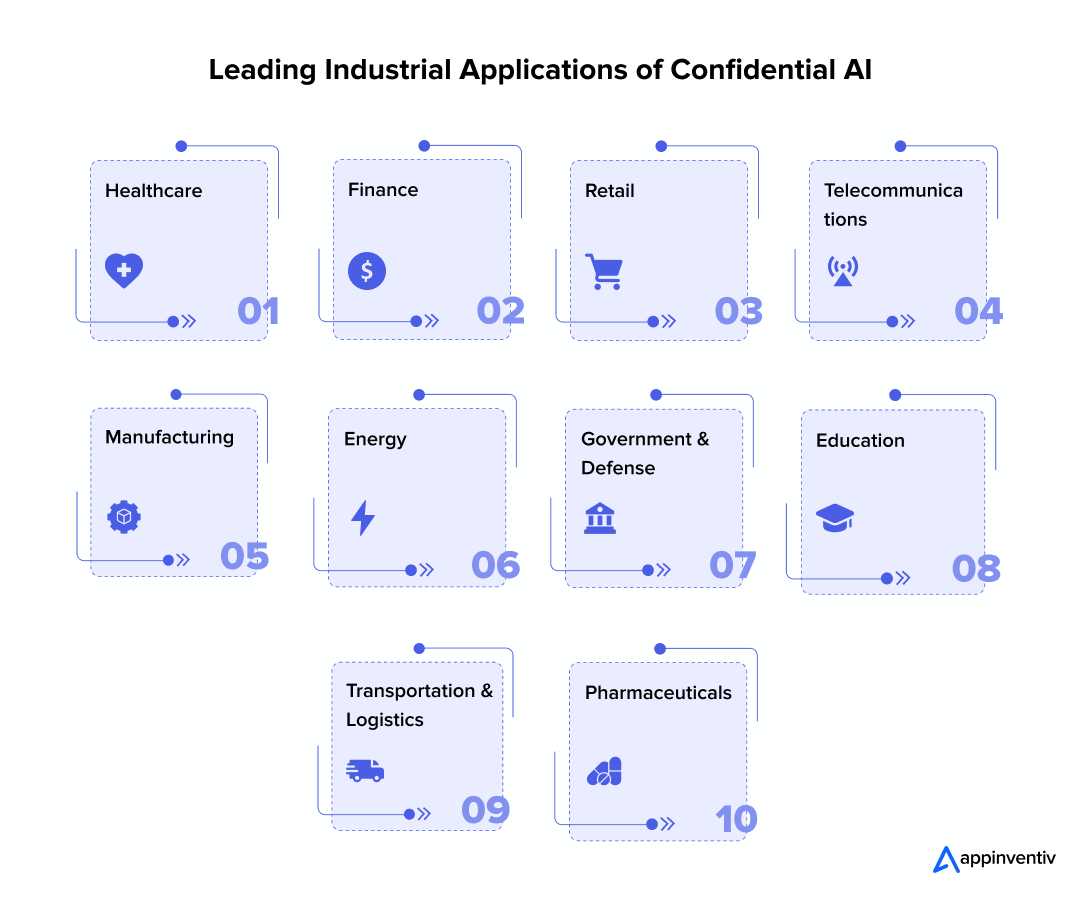
Healthcare
Hospitals, insurance companies, and research centers can now use secure AI technology in healthcare to analyze medical scans, genetic information, and patient records while keeping sensitive details completely private. This approach lets different medical institutions work together safely without breaking HIPAA compliance or GDPR privacy rules. The technology also speeds up new drug development by creating a protected space where researchers can study clinical trial information without security concerns.
Finance
AI data protection makes banking transactions, credit scoring, and fraud detection systems much more reliable. Banks can handle large money transfers and study customer patterns without putting private information at risk. The use of AI also helps financial companies follow international security regulations, which cuts down the chance of data breaches in online banking.
Retail
The utilization of AI in retail lets stores create personalized shopping suggestions and predict what customers will buy without revealing who those customers are. This protected AI keeps loyalty program details, purchase history, and payment data encrypted during analysis. Shoppers feel more confident about their privacy while stores can still improve their operations on a large scale.
Telecommunications
Confidential AI helps telecom companies handle call records, customer information, and network traffic without putting privacy at risk. It spots fraud in mobile payments right away, stops SIM card copying, and keeps 5G network launches safe. By protecting sensitive details, telecom companies stay within regulations and keep customers satisfied.
Also Read: Proven Telecom Fraud Prevention Strategies 2025
Manufacturing
Companies use AI for sensitive data to predict when machines need fixing, watch supply chains, and run smart factory systems. Manufacturers can study information from connected machines and factory equipment without revealing company secrets or supplier details. AI in manufacturing also lets factories around the world work together safely.
Energy
AI with strong data protection keeps smart grid information, power usage studies, and energy prediction models completely safe from outside threats. Energy companies can use AI to find power outages quickly, balance renewable energy sources more effectively, and cut grid waste while keeping customer usage details totally private. This protected AI also helps with mandatory government reporting requirements without creating major security worries for the company.
Government & Defense
AI for secret data handling lets government agencies study intelligence reports, monitor border activities, and manage defense supplies without any risk of information leaks. It creates completely trusted environments for important decision-making systems and helps governments adopt AI technology the right way. This protected AI also builds stronger public confidence by making sure sensitive national information stays absolutely secure from foreign interference.
Education
The use of Confidential AI in education sector helps colleges and education technology companies handle student grades, online learning information, and test scores without putting privacy at risk. It supports fair testing methods, secure teamwork tools, and smart learning programs while following FERPA and GDPR rules.
Transportation & Logistics
Protecting sensitive information in AI systems helps airlines, shipping businesses, and delivery companies plan better routes, track packages, and keep their vehicles safe. By securing location information, package details, and customer data, Confidential AI in the logistics sector keeps operations running smoothly without information leaks.
Pharmaceuticals
Secure AI lets drug companies handle molecular research information, patent details, and worldwide trial results without any leaks. It creates a protected space for AI systems that help with drug discovery, vaccine creation, and supply chain management.
Steps to Integrate Confidential AI
Adding confidential AI requires a structured approach that mixes security, compliance, and technical readiness. By following these steps, organizations can build privacy-first practices into their AI systems while making sure adoption goes smoothly across existing infrastructures.
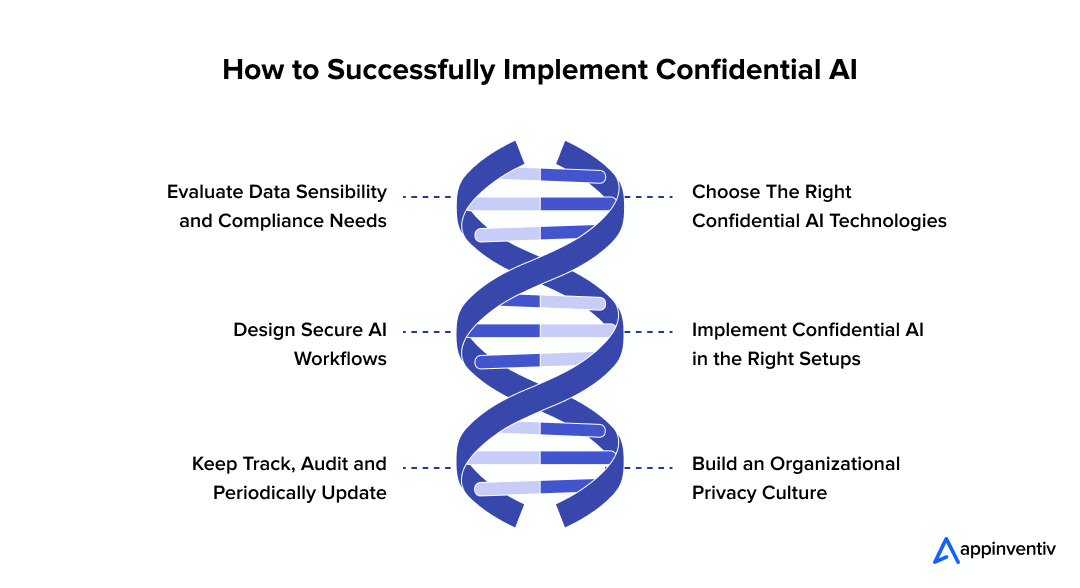
Evaluate Data Sensibility and Compliance Needs
The first step to take is to determine the sensitive datasets and the applicable regulations, including GDPR, HIPAA, or industry-specific regulations. The familiarity with data classification and compliance requirements would make sure that confidential AI countermeasures are focused and efficient at the initial stage.
Choose The Right Confidential AI Technologies
Select the right technologies, including trusted execution environments (TEEs), homomorphic encryption, federated learning, and secure multi-party computation (MPC). Selection will be based on the nature of the data, the degree of privacy needed, and the workflows of AI that you intend to implement.
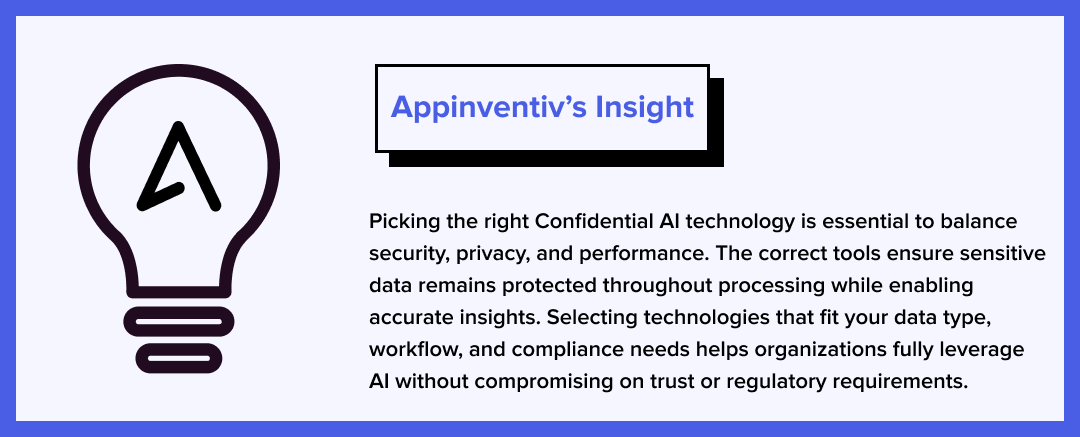
Design Secure AI Workflows
Build privacy-protecting methods into AI streams. This involves in-use encryption of data, AI data anonymization, and implementation of rigid access control procedures. The aim is to make sure that sensitive data is maintained during training, inference, and deployment.
Implement Confidential AI in the Right Setups
Choose the deployment models that fit your security, governance, and operational needs: cloud, on-premise, or hybrid. Indicatively, on-premise AI implementation can be adequate in highly regulated sectors, whereas confidential cloud implementations can be applied to offer scalability without privacy losses.
Keep Track, Audit, and Periodically Update
Create ongoing surveillance and auditing to identify anomalies, ensure compliance, and enforce strong AI data privacy. Keep AI practices secure and resilient with updated technologies and workflows as regulations, threats, or business needs evolve, enabling effective AI for managing confidential data.
Build an Organizational Privacy Culture
Educate the teams of the train on privacy, ethical practices of AI, and safe management of sensitive data. Inculcating a privacy-first culture throughout the organization will help AI-based privacy protection to become an operational priority instead of a one-time act.
We help you innovate confidently, keeping sensitive data secure throughout every stage of AI development and deployment.
Overcoming Challenges in Implementing Confidential AI
Confidential AI can be considered a strengthening tool in terms of data protection, but its implementation is associated with practical and technological difficulties. The awareness of these challenges and ways of overcoming them makes organizations capable of embracing confidential AI in a safe and efficient way.
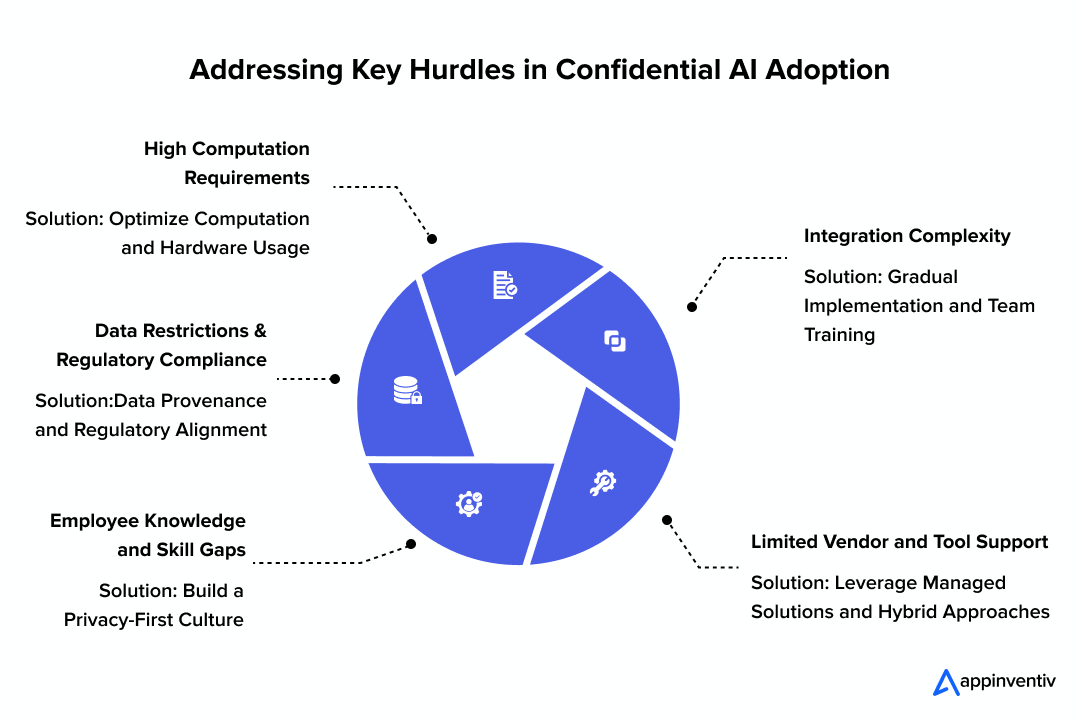
High Computerization
Challenge: Homomorphic encryption, secure enclaves, and federated learning are methods that demand heavy computing. This may slow AI training and inference, particularly on large data sets or complicated models.
Solution: To streamline organizational workflows, selective encryption (only sensitive information), the use of specialized hardware, such as terminals with TEEs, and the integration of various privacy-preserving methods can help organizations to achieve efficiency without reducing the level of security. This is a method of secure AI deployment even in the most demanding settings.
Integration Complexity
Challenge: As legacy systems or various IT environments, the existing AI pipelines might not be compatible with confidential AI. A lot of changes to the architecture may be needed to add these sophisticated privacy tools.
Solution: Go with a gradual implementation plan, with APIs and frameworks tailored to confidential AI. Sensitise the teams about proper data handling, privacy preserving workflow and AI model management can provide a smoother integration and also make AI for sensitive data.
Data Restrictions on Cross-Border and Regulatory Compliance
Challenge: Data privacy regulations in various countries and regions vary, which makes the implementation of AI with confidentiality challenges in international initiatives. Processing sensitive data across the borders is a sensitive issue that requires adherence to rules to comply.
Solution: Introduce strong AI data provenance tracking and audit to track the origin of data as well as its usage. Workflows in design that consider local data residency, and align AI functionality with international privacy norms, enhancing practices of private AI solutions.
Limited Vendor and Tool Support
Challenge: Confidential AI technologies are still pretty new, and there aren’t many ready-made tools or standard solutions compared to regular AI. Organizations often struggle to find the right mix of technologies.
Solution: Work with cloud providers that offer Confidential VMs, TEEs, or managed Confidential AI solutions for enterprises. Combine different privacy-preserving approaches like federated learning, encryption in use, and secure multi-party computation to cover any tooling gaps.
Employee Knowledge and Skill Gaps
Challenge: Teams usually don’t have much experience with privacy-focused AI, ethical guidelines, and advanced security methods. Mistakes during model training or deployment can leak sensitive data.
Solution: Give focused training on AI ethics and privacy, protecting sensitive data with AI, and create a privacy-first culture. Regular learning and solid internal policies help teams confidently implement confidential AI practices.
Implement Confidential AI with Appinventiv’s Proven Expertise
The future of confidential AI is closely related to the swift evolution of the new technologies. With agentic AI, generative AI and more powerful machine learning models reshaping industries, the role of privacy-first frameworks will only become more important. Such innovations are based on large amounts of sensitive data, and in the absence of effective protection, the threat of abuse or disclosure becomes especially high. Confidential AI will mean that as these tools progress forward, they will be based on a platform of trust, transparency and accountability, a principle championed by forward-thinking generative AI consulting partners.
Implementing security goes beyond being a requirement in compliance, it is the secret to innovation without loss. With embedded protections throughout the AI lifecycle, organizations can actively deploy automation, predictive intelligence and collaborative AI with confidence that the sensitive information will not be compromised. Such an approach creates a customer trust environment, fortifies partnerships, and prepares enterprises to grow in the long term.
Appinventiv has become a trusted partner for enterprises looking for advanced AI services and solutions that balance innovation with security. Our approach brings together technical expertise with industry insights, helping organizations add confidential AI while improving scalability, compliance, and long-term value creation.
As a leading AI consulting company, Appinventiv has delivered game-changing projects such as JobGet, Americana ALMP, MyExec, and Vyrb. Each case shows how our team helps businesses adopt next-generation AI while protecting their most valuable asset: data. By partnering with our experts, organizations can implement confidential AI with precision, ensuring both innovation and data protection are achieved.
Connect with our team today to explore how Appinventiv can help secure your AI journey and build trustworthy, privacy-focused AI solutions.
FAQs
Q. How to protect sensitive data with AI?
A. The need to support sensitive data with AI does entail encrypting data, controls on access, and monitoring of all data pipelines. Applying AI data protection strategies, organizations will be able to identify anomalies, avert unauthorized access, and ensure that the information is handled within regulatory regulations.
Q. How does Confidential AI protect sensitive data?
A. Confidential AI for data security ensures that private information remains encrypted and inaccessible even while being processed. It lets AI models analyze and generate insights without revealing raw data, which provides organizations with a secure means of utilizing customer data.
Q. What are the challenges of securing sensitive data in AI applications?
A. Here are some of the challenges of securing sensitive data in AI systems:
- Safeguarding training data from leaks or misuse
- Preventing AI model theft and unauthorized access
- Ensuring compliance with evolving privacy regulations
- Maintaining AI data security while balancing performance and control
- Protecting data throughout its lifecycle against emerging threats
Q. How to ensure confidentiality in AI models?
A. AI models can maintain confidentiality by use of strong encryption, federated learning, and privacy-preserving algorithms. Firms should also tighten the belt of strict governance policies and access control so that sensitive information is not given out at any time in training or deployment.


- In just 2 mins you will get a response
- Your idea is 100% protected by our Non Disclosure Agreement.
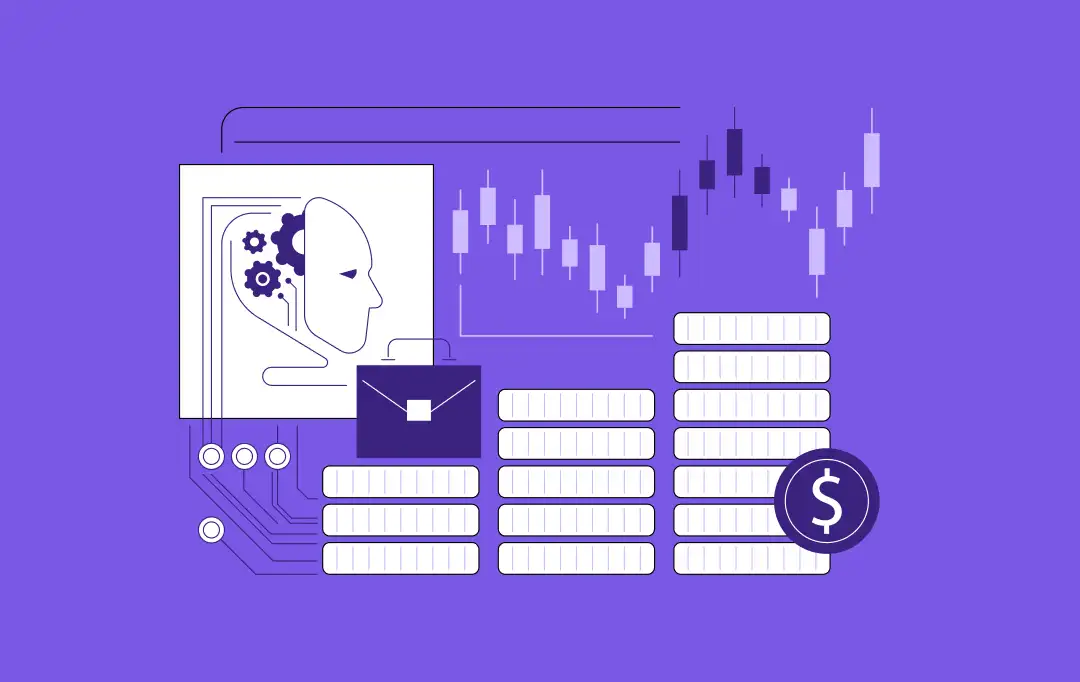
Key takeaways: AI reconciliation for enterprise finance is helping finance teams maintain control despite growing transaction complexity. AI-powered financial reconciliation solutions surfaces mismatches early, improving visibility and reducing close-cycle pressure. Hybrid reconciliation logic combining rules and AI improves accuracy while preserving audit transparency. Real-time financial reconciliation strengthens compliance readiness and reduces manual intervention. Successful adoption…

How to Develop an AI Chatbot for Education Platforms in UAE: Architecture, Cost, and Timeline
Key Takeaways AI chatbots are helping UAE institutions handle repetitive queries, reduce response delays, and improve the availability of student support. Bilingual capability, PDPL compliance, and integration with LMS and student systems are essential for successful deployment. Costs typically range from AED 150,000 to AED 1.47M ($40K–$400K), depending on integrations, personalization, and language support. AI-powered…
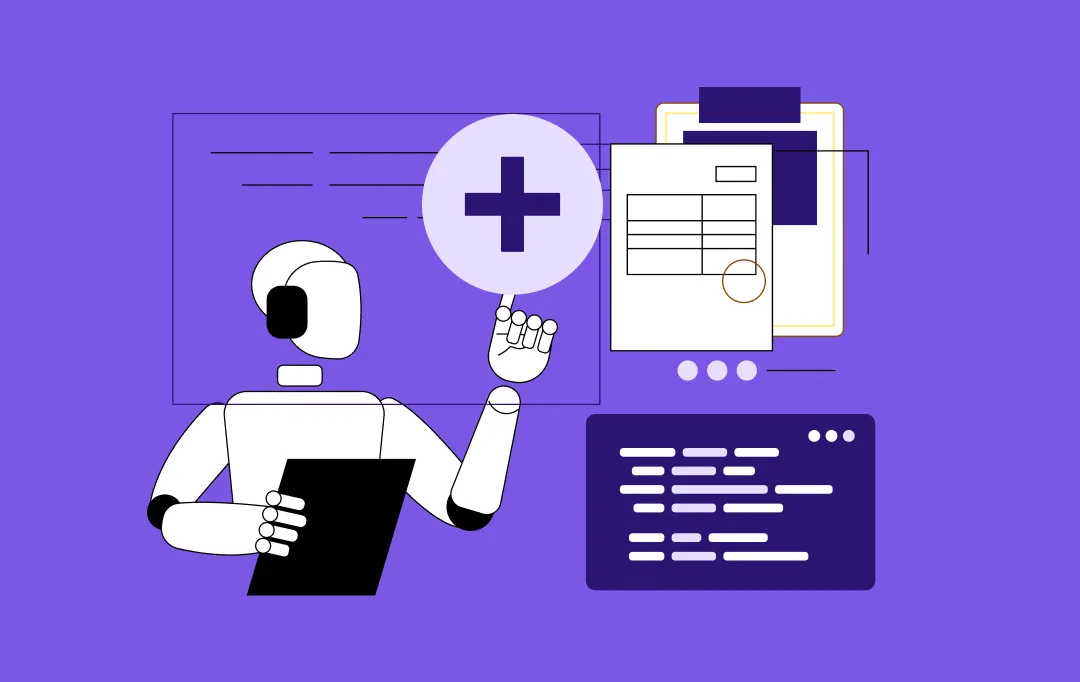
How AI in Healthcare Administration Cut Staff Workload by 40%
Key takeaways: AI automates claims, scheduling, intake, and documentation, cutting repetitive work and freeing staff to focus on oversight and patient coordination. AI validation tools flag incomplete records before submission, reduce avoidable denials by 10–20%, and improve clean-claim performance, enhancing revenue predictability. EHR and note-processing AI reclaim thousands of staff hours in large health systems,…




















